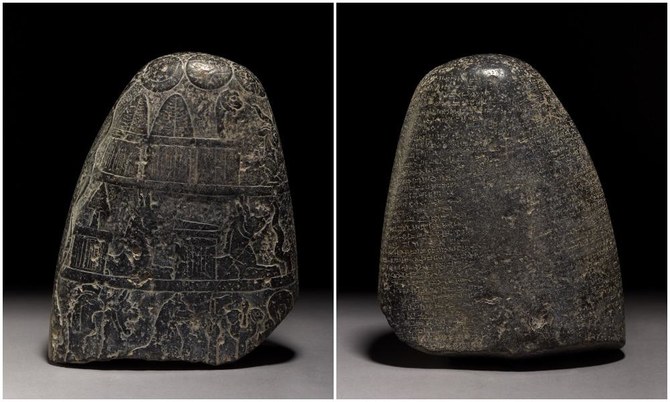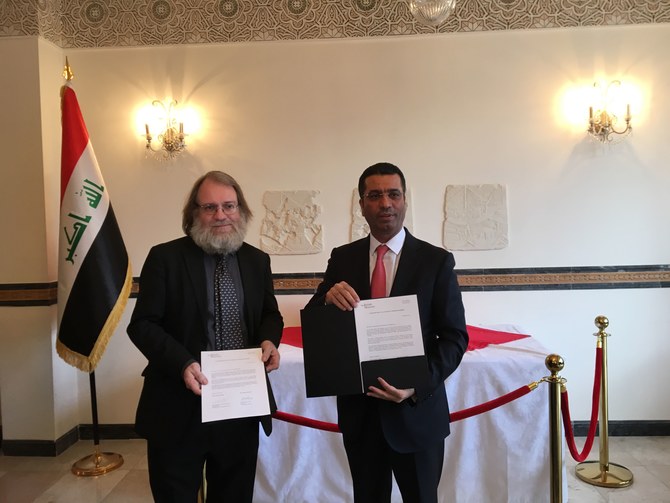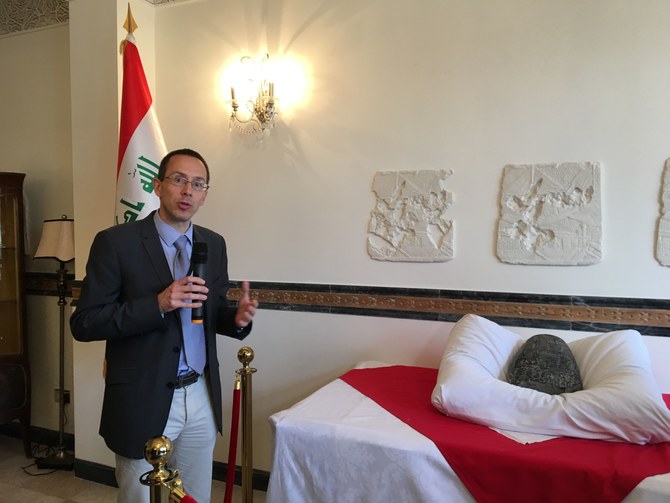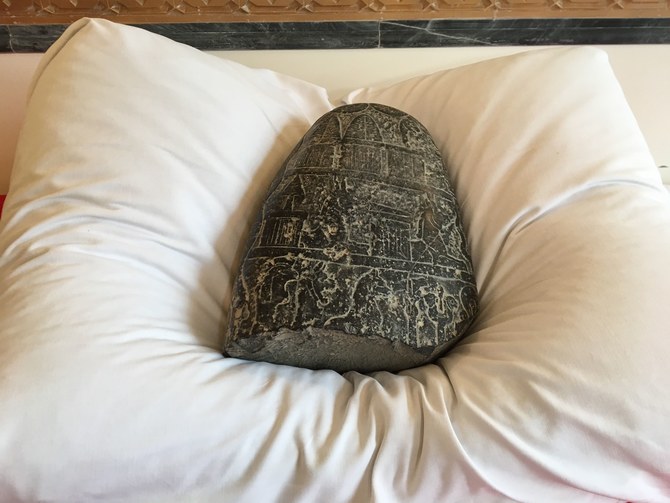LONDON: A 3,000-year-old carved stone tablet from Babylonia, said to place a curse on anyone who tries to destroy it, is to be flown home from Britain after being looted during the Iraq War.
British Museum director Hartwig Fischer handed over the priceless work to Iraqi Ambassador Salih Husain Ali during a ceremony on Tuesday after museum experts had verified its authenticity.
“It is a very important piece of Iraq’s cultural heritage,” said Fischer, praising the “extraordinary and tireless work” of border officials.
The attempt to smuggle the piece into Britain was thwarted by the UK Border Force at London’s Heathrow airport in May 2012.
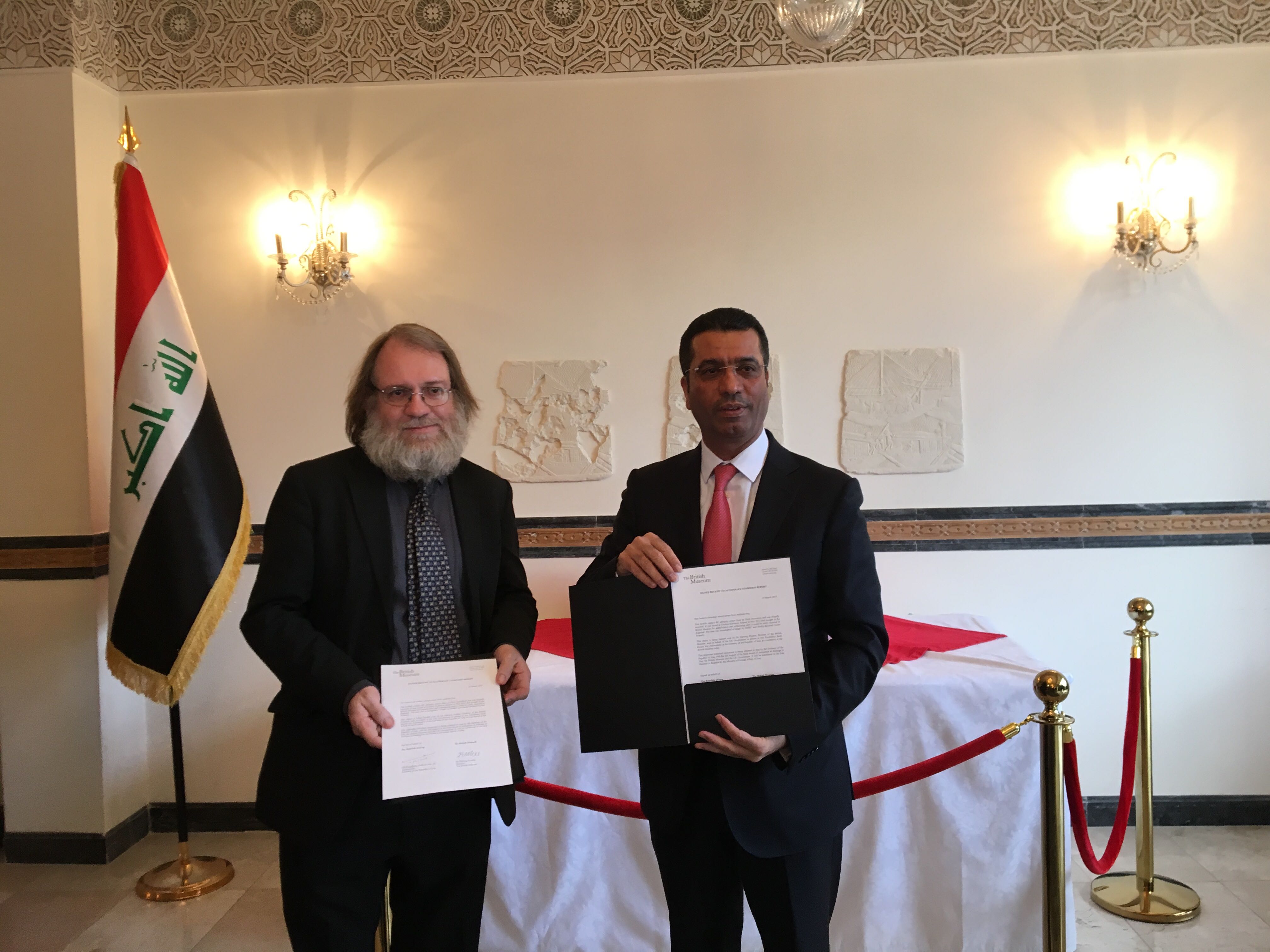
Dr. St John Simpson with Iraqi Ambassador Salih Husain Ali during the British Museum handover. (AN Photo/Sarah Glubb)
It had been declared at customs as a carved stone made in Turkey and valued at $330. But when the package was opened it caught the attention of a Border Force officer who recognized that the declaration was false.
After a long investigation against the importer, the case was resolved in favor of Iraq, with coordination from the British Museum, which acts as the specialist adviser on cultural property for the British government.
“They seized this item when they saw it at a British port and several years later, after a lot of legal work, we are able to effect this transfer,” said Michael Ellis, Britain’s Minister for Arts, Heritage and Tourism. “It’s a very important and significant moment.”
It is still not clear how the object was taken out of Iraq, “but we believe it was probably stolen about 15 years ago during troubles in Iraq,” Ellis added.
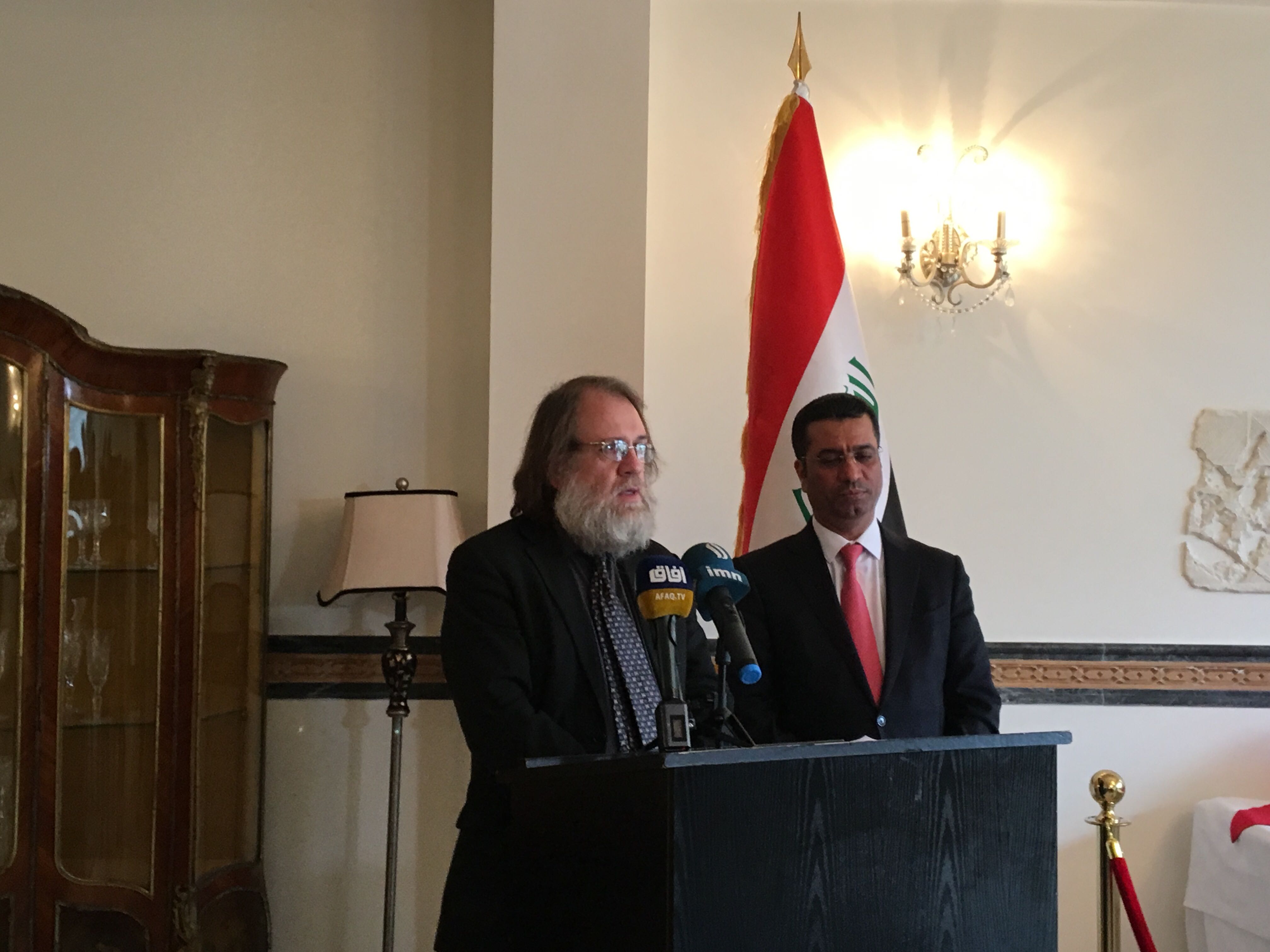
Dr. St John Simpson making a speech during the British Museum handover. (AN Photo/Sarah Glubb)
Ambassador Ali said the handover came after continued cooperation between the Iraqi embassy in London and the British authorities, including the Foreign and Commonwealth Office, the British Museum and British police.
“As a representative of the Iraqi government, I am looking to receive more handovers in the future if any Iraqi antiquities are found here,” Ambassador Ali told Arab News.
Dr. St. John Simpson, curator at the British Museum, also told Arab News that they "identified it very quickly as a very important inscribed Mesopotamian document of the 12th century B.C. of known king Nebuchadnezzar I, and that this object must have come from illegal excavations fairly recently in Iraq.”
He said from the contents of the inscription it appeared the piece came from Nippur, which was a big ancient Sumerian and Babylonian site in southern Iraq. It was heavily looted in 2003 and the museum believes the object came from that phase of destruction of a known archaeological site.
British minister for the Middle East and North Africa, Alistair Burt, said: “Iraq’s rich civilization, culture and history are globally important and sit at the core of its contemporary national identity. I am therefore delighted that the UK Border Force was able to retrieve the illegally trafficked kudurru and that today we can repatriate it, to sit proudly in the Iraq Museum in Baghdad.”
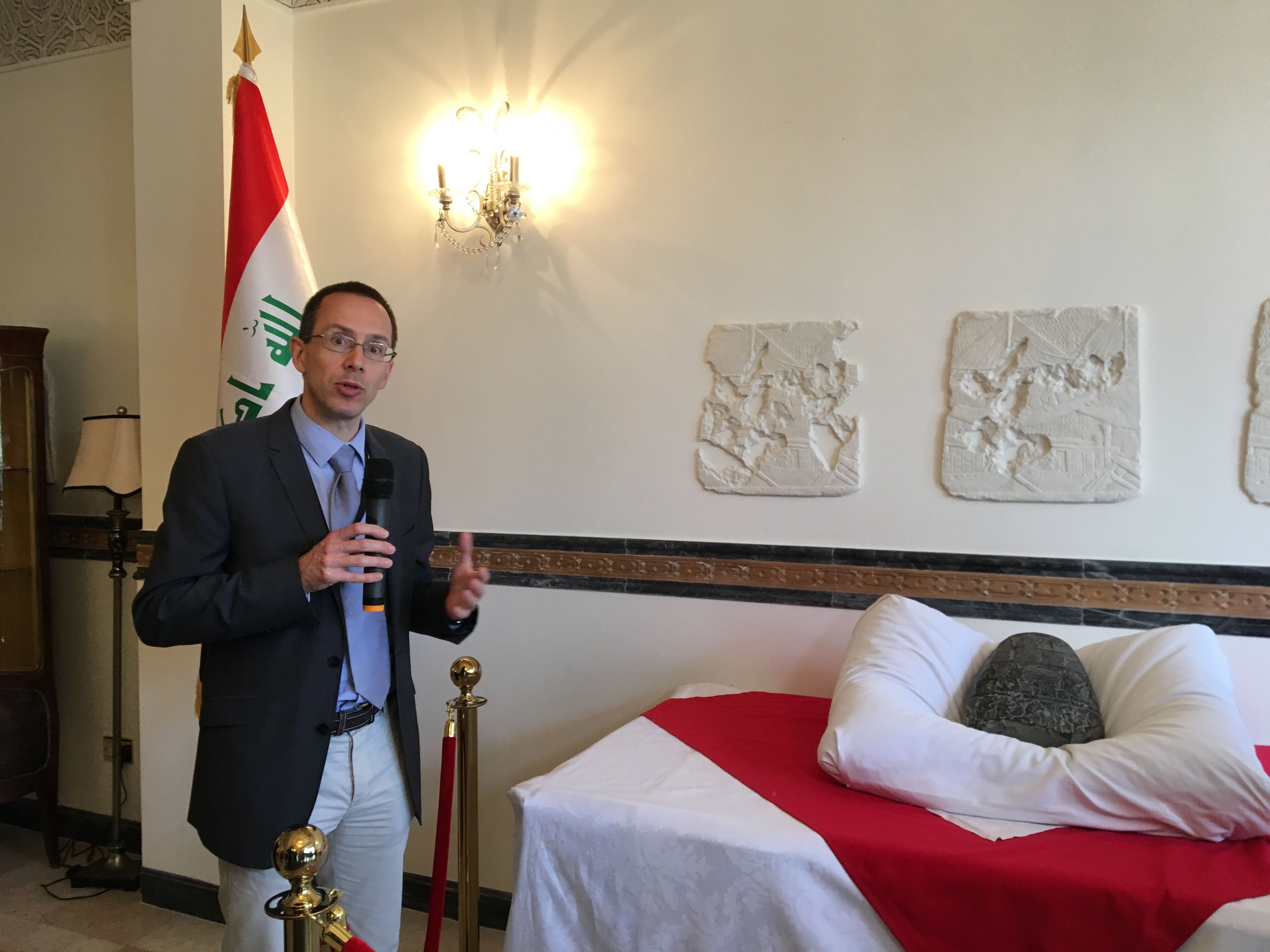
Curator Jonathan Taylor discussing the 3,000-year-old Babylonian tablet. (AN Photo/Sarah Glubb)
The kudurru is a ceremonial stone tablet recording the legal gifting of land by the Babylonian king Nebuchadnezzar I to one of his subjects in return for distinguished service, according to curator Jonathan Taylor.
On one side are depictions of the great Babylonian gods Enlil and Marduk, and on the other, legal text written in cuneiform, the Babylonian alphabet.
Taylor told Arab News: “What had happened a generation before King Nebuchadnezzar I was that the old dynasty had been swept away, the enemies had invaded, they captured the king, they looted the cities, they also looted the temples and they took away the statue of the city god Marduk, which meant not only the statue had gone but the god Marduk himself had been taken away and they no longer had his protection.”
Taylor added that the inscription says that the great god Enlil, the father of the gods, came up with a plan to save the day, so he created Nebuchadnezzar as the avenger of the Babylonians and the brave king marched into enemy territory, defeated the Elamite, took the statue back, brought it to Babylon and order was restored.
“It is such an important moment in Babylonian history. Forever after the Babylonians told stories about this great, brave king who brought Marduk back, and in response they created the Babylonian epic of creation, which tells about how Marduk was appointed to defeat the forces of chaos and to put order into the universe. So, every spring at the new year festival they recite this epic of creation.”
Taylor said the object also carried “terrible curses” for anyone trying to claim the land or damage the tablet.
“The gift is designed to last forever and there are a list of curses or protective formulas so if anyone should dispute that the gift was made or if they try and hide it, bury it in the dirt, try to destroy it with fire, smash it or get somebody who does not know any better to do it on their behalf, then the gods will curse them in a variety of really horrible ways. So, it is to protect forever this gift in recognition of this act of bravery,” said Taylor.
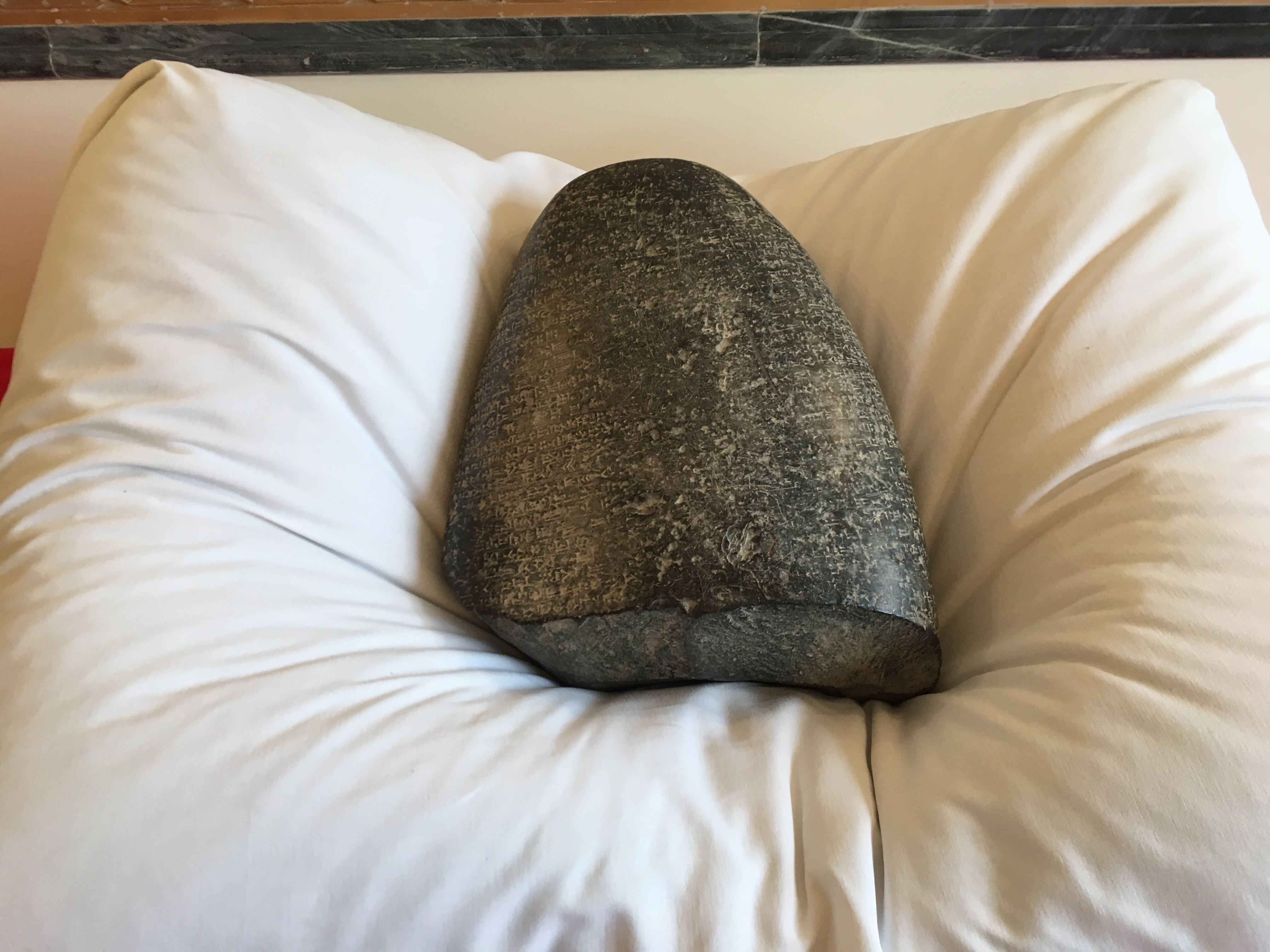
The 3,000-year-old carved stone tablet from Babylonia. (AN Photo/Sarah Glubb)
Fewer than 200 such objects are known to exist, and the one handed over on Tuesday was broken and eroded, presenting a problem for sleuths trying to establish its history.
“The basic identification was quite straightforward,” said Taylor. “More difficult was tying down exactly who the king was and what the circumstances were. For that we needed to read the inscription and it was quite worn, there was a lot of damage in the middle of the text. It was old-fashioned bookwork, but we had a few clues.”
Ellis said: “It’s more than just a carved stone... It is a testament to the remarkable history of the Republic of Iraq.”
This is the second handover so far on such a significant level. Eight antiquities were given back to Iraq seven months ago from the British Museum and it is investigating other cases of material coming from Iraq that will have to be returned.
“We would like to reboot our bilateral relations in many fields not just on the humanities side, but we are getting good support from our friends and through the global coalition to defeat terrorism in Iraq, especially Daesh,” said Ali.
Burt added: “This latest repatriation, in conjunction with the British Museum, is just one example of the UK’s ongoing commitment to helping Iraq create for itself a prosperous and secure future following the fall of Daesh; a goal it is well on the way to achieving.”
The initiative is part of a wider Iraqi scheme between the British Museum and the State Board of Antiquities and Heritage of Iraq (SBAH) in Baghdad.
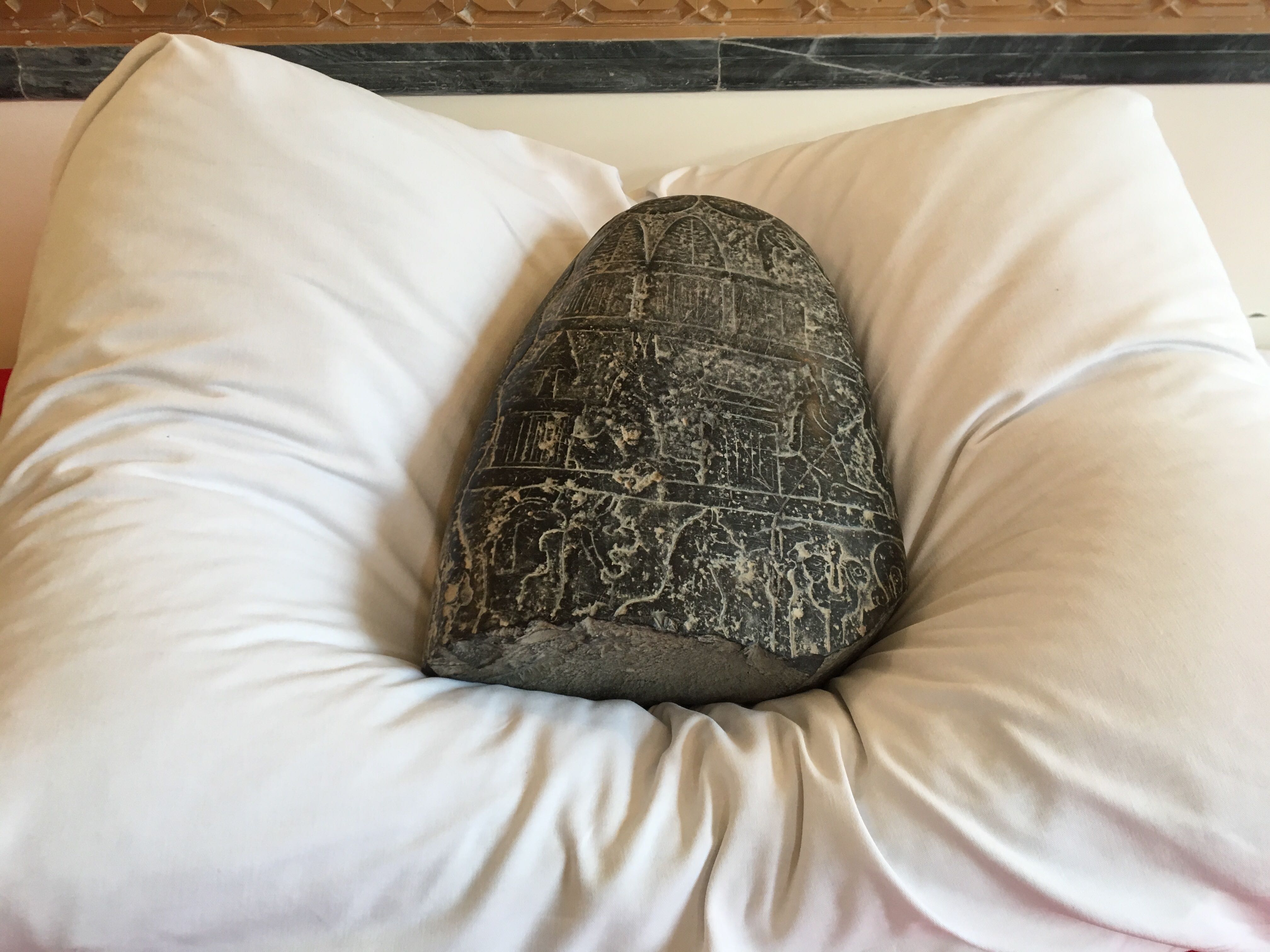
The 3,000-year-old carved stone tablet from Babylonia. (AN Photo/Sarah Glubb)
The scheme was initiated by Jonathan Tubb, keeper at the museum, in 2015 following the dreadful destruction of places such as Nimrud, Nineveh and Hatra, all in the Mosul region.
“It was quite clear that we couldn’t do anything on the ground, I mean nobody could get into that region and it would have been foolish to do so,” Tubb told Arab News.
The scheme introduced a constructive method of training SBAH employees in all the techniques they would need to confront the aftermath of the destruction, enabling them to work methodically and systematically from day one to record and excavate what was left.
They are trained in surveying, photographic and field archaeology techniques, as well as drone technology and have two excavation projects in Iraq, one in the north in Iraqi Kurdistan and one in the south at ancient Girsu (modern Tello).
“By the end of this scheme of which the first phase will be finished next April, we will have trained 50 employees altogether and they will go back to their various departments and train other people so there will be a drip-down effect of the expertise,” said Tubb.
“We are delighted to say that because of our training, several of the participants have been now appointed to senior positions within the state board and have been given responsibility for assessing the damages at these sites.”


